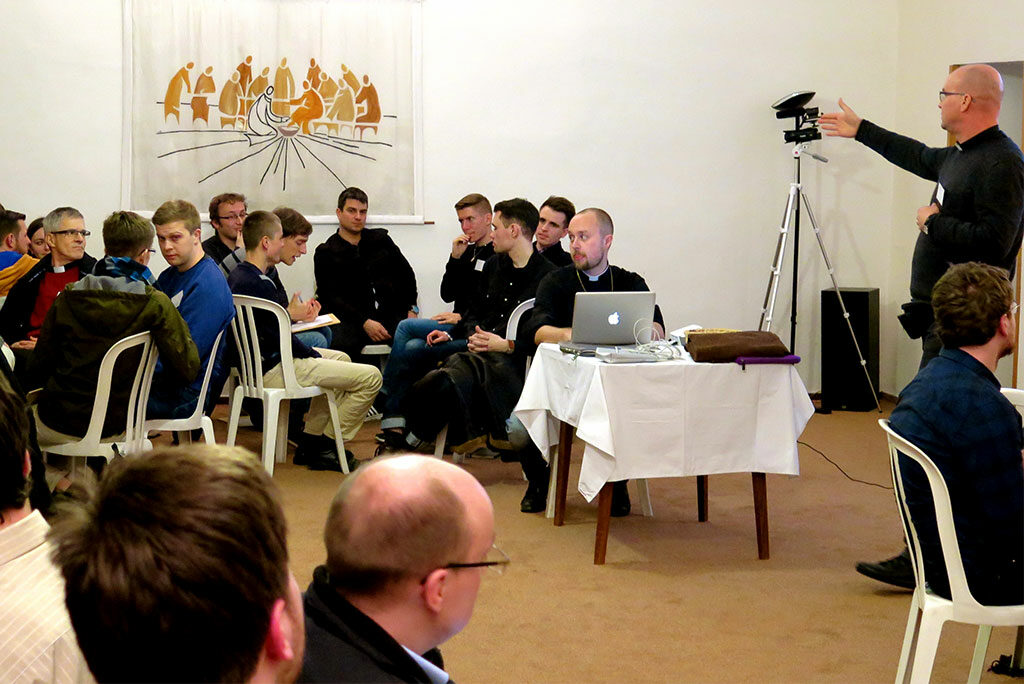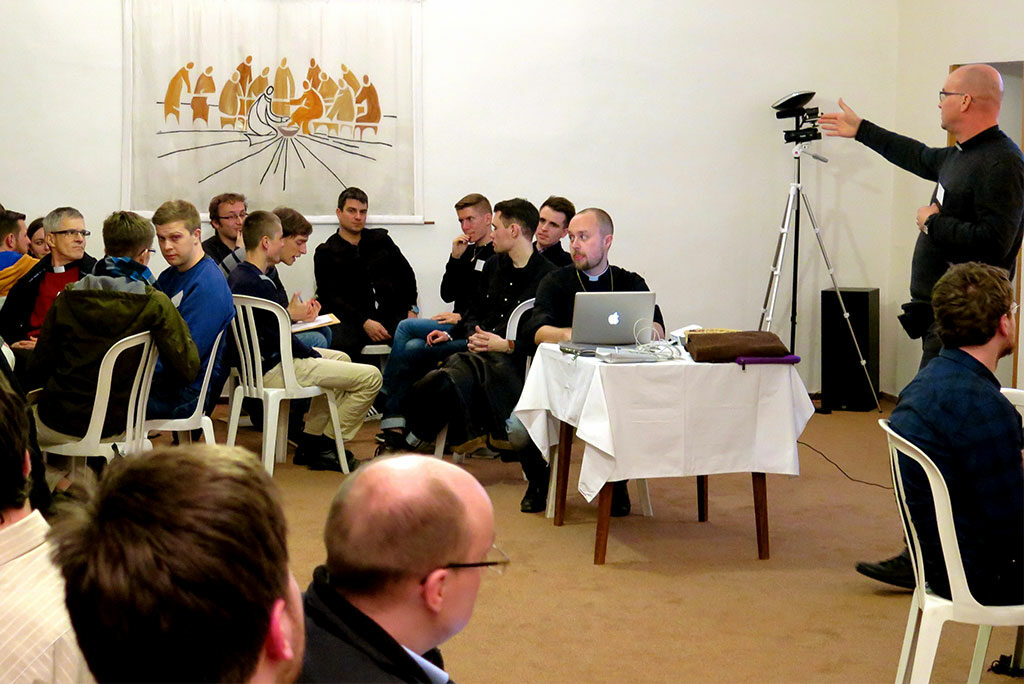
By Craig Donofrio
Some 60 young theologians from across Europe gathered for a Network of Young Lutheran Theologians (NYLT) conference Feb. 12-14 at Chemin Neuf monastery, just outside Prague, Czech Republic.
The Eurasia Region of the LCMS International Mission hosted the conference of participants from countries including Finland, Sweden, Norway, Germany, England, the Czech Republic, Albania and the United States.
“The main goal of NYLT is to share our common Lutheran faith and to be able to help struggling brothers and sisters all over Europe,” said the Rev. Sebastian Grünbaum, pastor of two congregations of the Evangelical Lutheran Mission Diocese of Finland in Turku, Finland. A conference organizer, Grünbaum helped found the network in 2011.
“NYLT is not so much about teaching,” he said, “because people already know a lot of theology. It is more about sharing practical insights and discussing current situations in specific contexts.”
Eurasia Region Director Rev. James Krikava echoed the need for such a group.
“Being a confessional Lutheran in our region is a lonely way,” according to Krikava. “We need each other to shore each other up in our faith. Opportunities to actually sit down and talk to like-minded Christians and Lutherans are valuable to our own resolve in strengthening our witness of Christ, comforting in getting to know others who suffer for the Gospel with us, and edifying in sharing our common confession together.”
Conference discussions revolved around missions and outreach, especially as the young Lutheran pastors and laypeople witness about the saving grace of Jesus Christ to Islamic refugees.
Danielle Volkmar, the wife of a seminarian from the Independent Evangelical Lutheran Church of Germany (SELK) — who attended with her husband and who is an American raised in the LCMS — shared her impressions of the conference.
“It seemed to be the majority’s opinion,” she said, “that missionary work cannot happen without the — at least eventual — presence of and participation in the Divine Service. This of course brought up the necessity of pastors being in the mission field. All agreed the Word and Sacraments are central, but there were considerable differences as to what degree form and content can be differentiated.
“It was certainly interesting to learn how much each country’s opinion was highly reactionary against struggles in the past,” Volkmar added.
Leipzig, Germany-based LCMS Missionary Rev. Dr. Christopher Ahlman said he was impressed with the discussions because they were “the most well-organized examples of such that I have ever witnessed. Many people holding common interests … engaged in conversation in deferential, smart and winsome ways.”
Kristin Lange, managing director of the International Lutheran Society of Wittenberg (Germany), said “from my stance as an LCMS missionary, we should go into our various fields as pupils of our native Lutheran brothers and sisters, taking their lead on how church work is done in a given country.”
Conference discussions offered an opportunity for LCMS missionaries to learn more about their contexts and how they could work with others in the region.
Krikava spoke to the conference about mission work done in the Czech Republic, beginning in 1990, “and how Lutheran doctrine, liturgy, hymnody and ceremony worked together in bringing the Gospel to the Czech people, who had lived for 40 years under atheistic communism.”
Several participants underscored the importance of the services in which they worshiped together.
“The reverence in the worship services and the confessional stance of these young Lutheran pastors and laypeople brings much hope and promise for the future of Christ-centered and orthodox Lutheranism in Europe,” said Krikava.
On Saturday night (Feb. 13), the young theologians were entertained with a traditional Czech meal and Czech bluegrass music — including banjo and guitar stylings by Krikava.
“The amazing traditional Czech dinner party organized by the Krikavas and sponsored by the LCMS was a surprising treat,” said Volkmar. “The atmosphere at that celebration was truly heartwarming.”
Plans for a similar NYLT conference next February are already underway. NYLT coordinators including Grünbaum indicate that they will work with Lange to organize the conference planned to take place at the International Lutheran Center (at the Old Latin School) in Wittenberg.
The Rev. Craig Donofrio (craig.donofrio@lcmsintl.org) is director of Communications for the Eurasia Region, with the LCMS Office of International Mission. Deaconess Elizabeth Ahlman (elizabeth.ahlman@lcmsintl.org), communications specialist for the region, assisted with this article.
Posted March 18, 2016 / Updated March 19, March 23 and April 11, 2016
